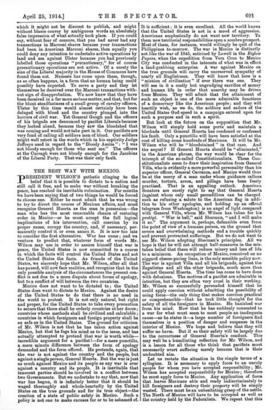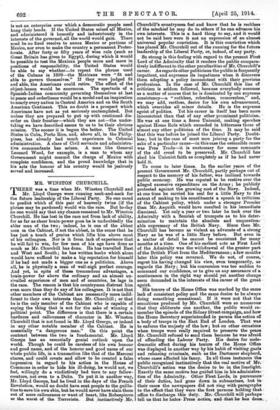THE BEST WAY WITH MEXICO.
PRESIDENT WILSON'S pathetic clinging to the belief that it is possible to dictate to a nation and still call it free, and to make war without breaking the peace, has reached its inevitable culmination. For months we have been saying that of two things he would be forced to choose one. Either he must admit that he was wrong to try to direct the course of Mexican affairs, and must recognize General Huerta as the man in possession—the man who has the most reasonable chance of restoring order in Mexico—or he must accept the full logical implications of his intervention, call coercion by its proper name, occupy the country, and, if necessary, per- manently control it or even annex it. It is now too late to consider the first alternative. War has come ; and we venture to predict that, whatever form of words Mr. Wilson may use in order to assure himself that war is peace, the United States is now committed to a course in which the facts will control the United States and not the United States the facts. As friends of the United States, we sincerely hope that Mr. Wilson, after all that has passed, will now face realities, and recognize that in the only possible analysis of the circumstances the present con- flict is not due to a mere dispute about forms of apology, but to a conflict of will between the two countries.
Mexico does not want to be dictated to ; the United States does want to dictate to Mexico. Against the desire of the United States to do that there is no need in the world to protest. It is not only natural, but right and proper, for the United States to take every precaution to secure that there shall be orderly countries at her doors; countries whose methods shall be civilized and calculable ; countries in which foreigners and foreign property shall be as safe as in the United States. The ground for criticism of Mr. Wilson is not that he has taken action against Mexico, but that he fogs his mind as to the issue, and has actually attempted to pretend that war is worth while— incredible argument for a pacifist l—for a mere punctilio, a mere minute difference between the form of apology demanded and the form offered. He pretends, again, that the war is not against the country and the people, but against a single person, General Huerta. But the war is just DA much against Mexico and its people as any war is ever against a country and its people. It is inevitable that innocent parties should be involved in a conflict between two Governments. But we undertake to say that, now that war has begun, it is infinitely better that it should be waged thoroughly and whole-heartedly by the United States on the true grounds and for its true object—the creation of a state of public safety in Mexico. Such a policy is not one to make excuses for or to be ashamed of. It is sufficient ; it is even excellent. All the world knows that the United States is not in a mood of aggression. Americans emphatically do not want now territory. To them new territorial responsibilities open a sombre prospect. Most of them, for instance, would willingly be quit of the Philippines to-morrow. The war in Mexico is distinctly not like the war of 1845, satirized by Lowell in the Biglow Papers, when the expedition from Vera Cruz to Mexico City was conducted in the interests of what was in effect a land-grabbing enterprise. A war against Mexico on the true grounds will carry the unreserved sympathy of nearly all Englishmen. They will know that here is a "mission of civilization" if ever there was one. They will see in it a costly but ungrudging sacrifice of money and human life in order that anarchy may be driven from Mexico. They will admit that the attainment of such an object is one of the more admirable functions of a democracy like the American people ; and they will heartily wish, as we do, the soldiers and sailors of the United States God-speed in a campaign entered upon for such a purpose and in such a spirit.
But look at the future on the supposition that Mr. Wilson will simply hold some ports and maintain a blockade until General Huerta has condoned or confessed his fault. Only a punctilio will have been satisfied at the cost of killing some hundreds of Mexicans. It will be Mr. Wilson who will be " bloodstained " in that case. And the sequel ? If General Huerta should be "eliminated," in the American phrase, the way would be clear for the triumph of the so-called Constitutionalists. These Con- stitutionalists seem to draw their inspiration from General Villa, who is evidently a more powerful personality than his superior officer, General Carranza, and Mexico would thus be at the mercy of a man under whose guidance callous murder, torture, arson, and pillage have been freely practised. That is an appalling outlook. American Senators are surely right to say that General Huerta (against whom only small peccadilloes can be charged such as refusing a salute to the American flag in addi- tion to his other apologies, and holding up an official telegram from Washington) is an angel of light compared with General Villa, whom Mr. Wilson has taken for his protege% " War is hell," said Sherman, " and I will make it so." The argument is, perhaps, defensible even from the point of view of a humane person, on the ground that severe and overwhelming methods end a trouble quickly and prevent protracted sufferings. But we do not want to see Mr. Wilson adopting Sherman's principles. All we hope is that he will not attempt half-measures in the mis- taken belief that these will reduce misery and loss of life to a minimum. An occupation of Mexico, conceived on no niggard cheese-paring lines, is the only sensible policy now. The war is against Villa and all his brigands, against the Zapatistas and all the other brigands, much more than against General Huerta. The time has come to have done with delusions. The motives of a pacifist are admirable in intention, but they are often very cruel in their working. Mr. Wilson so successfully persuaded himself that he could apply coercion without admitting the possibility of using force—the only thing that makes coercion practical or comprehensible—that he took little thought for the safety of all the foreigners in Mexico. He banished war from his mind. Now that be has suddenly consented to a war for what must seem to most people an inadequate cause—as he states it—a large number of foreigners find themselves in a position of danger and suspense in the interior of Mexico. We hope and believe that they will suffer no harm. But if so their safety will be largely due to the correctness of General Huerta's conduct. This may well be a humiliating reflection for Mr. Wilson, and is a lesson for all those who think that pacifists must necessarily avert suffering merely because that is their undoubted aim.
Let us restate the situation in the simple terms of a syllogism. It is necessary to apply force to an unruly people for whom you have accepted responsibility ; Mr. Wilson has accepted responsibility for Mexico ; therefore he must apply force to Mexico. Any application of force that leaves Mexicans able and ready indiscriminately to kill foreigners and destroy their property will be simply wasted. There must be an unhesitating grasp of the nettle. The North of Mexico will have to be occupied as well as the country held by the Federalists. We repeat that this is not an enterprise over which a democratic people need bang their heads. If the United States seized all Mexico, and administered it honestly and industriously in the interests of the governed, all the world would gain. There need be no fixed resolve to annex Mexico or portions of Mexico, nor even to make the country a permanent Protec- torate. After forty or fifty years of wise rule (such as Great Britain has given to Egypt), during which it would be possible to test the Mexican people more and more in positions of responsibility, the United States would be able to say whether—to repeat the phrase used of the Cubans in 1898—the Mexicans were " fit and able to govern themselves." If they were judged fit and able, the Americans could retire. The effect of the object-lesson would be enormous. The spectacle of a Spanish-Indian community governing themselves at last in peace and orderliness would be a model and an inspiration to nearly every nation in Central America and on the South American Continent. This no doubt is a prospect which Americans have not as yet seriously contemplated. But unless they are prepared to put up with continued dis- order on their frontier—which they are not—the under- taking we have described seems to us to be their obvious mission. The sooner it is begun the better. The United States in Cuba, Porto Rico, and, above all, in the Philip- pines, has already had much experience in Colonial administration. A class of Civil servants and administra- tive commandants has arisen. A. man like General Leonard Wood, for example, is a man to whom any Government might commit the charge of Mexico with complete confidence, and the proud knowledge that in his acts the honour of his country would be jealously served and increased.



























































 Previous page
Previous page